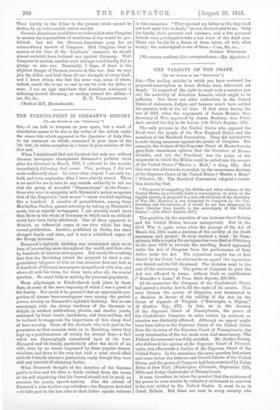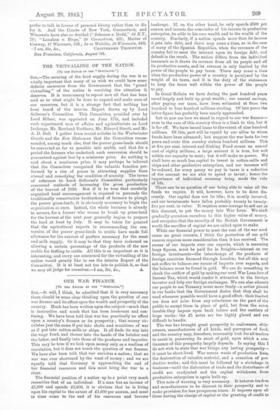THE VALIDITY OF THE DRAFT.
[To THE EDITOR OP THE "SPECTATOR."]
SIR,—The leading articles in which you have reviewed the proposed conscription in Great Britain have interested ma deeply. In support of the right to enact such a measure you cite the authority of Abraham Lincoln, which ought to be sufficient. But there are other authorities in the United
States of statesmen, Judges, and lawyers' which have settled the question with us for all time. It first arose during the war of 1812, when the arguments of James Monroe, then Secretary of War, approved by James Madison, then Presi- dent, carried the day in its favour (71h Niles's Register, 137), The only persons in the United States who opposed the Draft were the people of the New England States and the members of the Hartford Convention. They did notIesitate to take strong measures against the power of Congress. For example, the Judges of the Supreme Court of Massachusetts gave their unanimous opinion that the Governor of Massa-
chusetts, and not the President, was the judge Of the' exigencies in which the Militia could be called into the service of the United States ("Martin v. Mott," 6 Gray, 121). But this ease was afterwards overruled by the unanimous decision of the Supreme Court of the United States ("Martin v. Mott," 7 Wheaton, 19). The Hartford Convention adopted a resolu- tion declaring that
"The power of compelling the Militia and other citizens of the United States, by a forcible draft or conscription, to serve in the regular armies, as proposed in a late official letter of the Secretary of War (Mr. Monroe), is not delegated to Congress by the Con- stitution, and tho exercise of it would be not Iess dangerous to their liberties than hostile to the sovereignty of the United States."—(71h Nites's Register, 307.) The question, by the cessation of war between Great Britain and the United States, became unimportant. But in the Civil War it again arose, when the passage of the Act of March 3rd, 1833, made a decision of the validity of the Draft necessary and proper. It soon reached a head. In Penn- sylvania bills in equity for an injunction were filed at Pittsburg in the year 1863 to restrain the enrolling Board appointed
under the Act of Congress from the performance of their duties under the Act. The injunction sought was at first denied by the Court, but afterwards on appeal the injunction was denied and the bill dismissed. The decision went tO tlie. root of the controversy. The power of Congress to pass the Act was affirmed in terms, without limit or qualification (" Kneedler v. Lane," 45 Penn. State .Reports, 238-338).
At the same time the Congress of the Confederate States had passed a similar Act to fill the ranks of its armies. This soon became the source of litigation, and terminated in a decision in favour of the validity of the Act by the Court of Appeals of Virginia (" Burroughs v. Peyton," 16 Grattan Rep., 470). In this, as in the decision of the Supreme Court of Pennsylvania, the power of the Confederate Congress to raise armies by contract ot coercion was distinctly affirmed. Although an appeal might have been taken to the Supreme Court of the United States from the decision of the Supreme Court of Pennsylvania, the early termination of the war made even that unnecessary. The Federal Govenirnent was fully satisfied. Mr. Justice Strong, who delivered the opinion of the Supreme Court of Pennsyl- vania, was afterwards a Justice of the Supreme Court of the United States. In the meantime, the same question had arisen and come before the District and Circuit Courts of the United States, and the power of Congress bad been sustained by Judge Betts of New York (Washington Chronicle, September 19th, 1860) and Judge Cadwalacler of Pennsylvania.
It may, therefore, be taken for granted-that the existence of the power to raise armies by voluntary enlistment or coercion is for ever settled in the United States. It, must be so in Great Britain. But there are men in every country who prefer to talk in favour of personal liberty rather than to die for it. And the Courts of New York, Connecticut, and Wisconsin have also so decided (" Johnson v. Dodd," 56 N.Y., 70; " Lanaban v. Birge," 30 Connecticut, 438; Matter of Conway, 17 Wisconsin, 526; In re Welditz, 16 Wisconsin, 443).
San Francisco, California, August 7th.



































 Previous page
Previous page